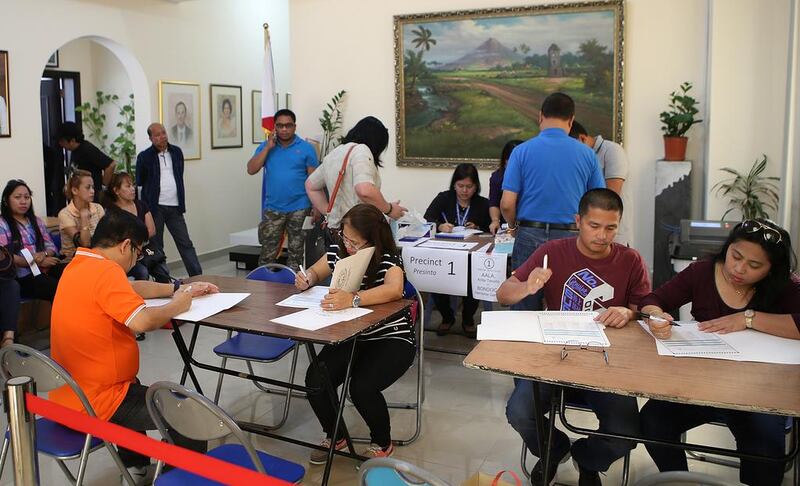ABU DHABI // Efforts to increase voter turnout in the UAE are bearing fruit, with more than 27,000 ballots cast in the past two weeks since voting by Filipino expatriates for their new president began on April 9.
By Saturday, 11,015 of those registered had cast their votes at the Philippine embassy in Abu Dhabi, and 16,619 at the consulate in Dubai.
There are 72,437 Filipinos in Abu Dhabi and 123,185 in Dubai and the Northern Emirates who are eligible to vote at the embassy or consulate. There are also 224 seafarers who signed up as overseas absentee voters in Abu Dhabi, and 768 in Dubai.
“The consulate in Dubai is one of the largest foreign service posts in terms of the number of registered voters, so only getting as much as 13 per cent so far impacts on the total number of votes cast for overseas Filipinos,” said Paul Raymond Cortes, the consul general in Dubai.
“Not voting impacts democracy, and impacts the chances of the least-favoured candidates to boost their ratings.
“I was expecting a little more vigorous activity in terms of voting trends in Dubai. We are the most empowered and we should use that as a means to speak up and make known to the Filipino government policymakers what Dubai feels as far as governance, public administration, public policies are concerned.”
Rowena Daquipil, the vice consul at the Philippine embassy, expected voters to come in slowly this week and then a last-minute rush as the end of voting draws near.
“With an initial voter turnout here in Abu Dhabi as of April 23, we are revising our target from 80 to 50 per cent,” she said. “The average number of voters per day on weekdays is more than 700, while it’s more than 1,000 on weekends.
“That’s not bad, but we should encourage more people to vote – about 400 for each of the six precincts per day.”
Ms Daquipil was counting on the Filipino community to provide transport to fellow voters who reside in far-flung areas.
“It would be a big help for us since I had to take the bus to get here,” said Hazel Ayuman, 41, who works in Al Ain and was a first-time voter. “We all want change in our government and should not miss this chance to vote for a new president.”
For the past two weekends the consulate in Dubai had conducted field-voting in areas frequented by Filipinos. These were coordinated with the local authorities.
“For the third and fourth week of voting we may see a spike,” Mr Cortes said. “I’ve been cautioning the community that we cannot squeeze in 20,000 to 30,000 voters in the consulate premises during the last few days of voting until May 9. It would be chaotic.”
Voting will end on May 9 at 1pm, when the presidential polls close in the Philippines at 5pm local time. “I urge Filipinos to vote now, to do it as early as they can,” Mr Cortes said. “I don’t see any reason why they cannot visit the consulate after working hours when we have extended our voting hours until 9pm.”
This weekend, field voting in Dubai will be conducted in J5 Rimal Hotel Apartments on Muraqqabat Road in Deira, and in Al Barsha, behind the Mall of the Emirates, to accommodate voters in Jebel Ali, the Meadows and Discovery Gardens.
“I am still confident both posts will be able to reach their targets,” said Rafael Seguis, Philippines’ foreign affairs undersecretary and overseas voting secretariat chairman at Manila’s department of foreign affairs.
rruiz@thenational.ae






